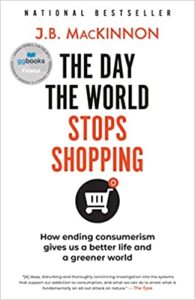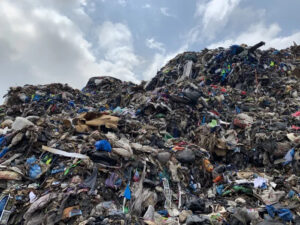Published by Vintage Canada, a division of Penguin Random House Canada Ltd., 2022
Review by Bill Locke
 “The Day The World Stops Shopping”? On first glance, it sounds like The Day The World Stood Still, or maybe …The World Exploded, or even worse …Was Attacked by Aliens. Pretty scary stuff. After all, how could the world stop shopping? Sounds impossible. We need things, don’t we? All of the time. Or so we think.
“The Day The World Stops Shopping”? On first glance, it sounds like The Day The World Stood Still, or maybe …The World Exploded, or even worse …Was Attacked by Aliens. Pretty scary stuff. After all, how could the world stop shopping? Sounds impossible. We need things, don’t we? All of the time. Or so we think.
The trouble is, we are using up the planet at almost double the rate it can regenerate. And that reality is becoming increasingly clear.
In this somewhat audacious but empowering book, MacKinnon takes us on a trek into our consumer lifestyle and desire for endless products, through the chain of processes that provide them, to examine what a new world with much less consumption would be like – and to consider some of the rarely considered benefits. Studying situations in which economies have shut down temporarily, examining lifestyles of crafts and arts producers, exploring minimalist societies, and aggregating expert analysis, The Day The World Stops Shopping is an illuminating history of global consumerism. It is also a profound musing about a very different reality than we in the west are used to. It provides us a carefully researched and sometimes daunting journey to a possible new future, one that would be much better for our planet and all its inhabitants.
On this journey, we are taken back in time and to places around the world today, where consumerism as we know it does not rule. MacKinnon shows us what life might be like without our big-box temples of retailing, and what could happen if we stopped using our credit cards so furiously.
I found the chapter on our retail clothing habits to be particularly telling. We find out that consumers, especially Westerners, buy clothes and throw them away at a spectacular rate. Today, we buy on average 15 items apiece per year for everyone on earth. In total, people on our planet buy one hundred billion articles of clothing every year, double what we purchased 15 years ago.

A mountain of excess used clothing and textiles from the “global north”, near a clothing market in Ghana. (Source: The Or Foundation: “Too much clothing/not enough justice”)
Demand, we discover, is so great that the big clothing factories in Bangladesh and other countries with cheap labour employ four million workers. As it stands now, workers in these big factories earn $120 to $150 per month, while working twelve and sometimes more hours per day, six days a week.
Imagine if we stopped shopping for clothing so compulsively.
MacKinnon presents us this alternate scenario, and lets us see what would unfold. Envision a world in which we Westerners bought fewer clothes and kept our clothes longer. A reduction in demand from the marketplace could actually have a positive effect in this case. Some of the employees in the big factories will lose their jobs, but those that remain would produce better quality clothing that would last longer. And that would mean that these employees would have to be skilled up, and paid more.
One factory owner in Bangladesh says that the quality of the products his factory produces makes him sick. The 200,000 articles of clothing his company spews out every day are, in his words, “junk”. At a production cost of $1 per shirt, and $2 for pants including materials and labor, they are nothing like the clothing his family business produced in generations past. When his grandfather ran the factory, the business produced elegant silk products with custom designs which lasted a lifetime.
“Now,” he says, “our customers demand a fast-fashion T-shirt in an American store for four dollars or less, including packaging, distribution, shipping and retail markups. We need to reduce our buying, slow down, and improve the quality of our products, increase the pay for those who produce them, and be satisfied with fewer but better things.”
MacKinnon carefully and methodically untangles our shopping systems, supply chains, economic processes and ways of living to show we are all caught up with ever-increasing marketing, demand, production, distribution, display, and sales. And he shows us how we can live differently and more sustainably – aided by lessons recently learned during the coronavirus pandemic when our shopping was suddenly reduced dramatically.
The book is not only thoughtful and challenging, it is also fascinating. As well, I found it to be deeply hopeful, especially at this juncture in history. MacKinnon’s previous books include The Once and Future World, a bestseller about rewilding the natural world; The 100-Mile Diet (with Alisa Smith), widely recognized as a catalyst of the local foods movement; I Live Here (with Mia Kirshner and artists Michael Simons and Paul Shoebridge), a ‘paper documentary’ about displaced people; and Dead Man in Paradise, the story of a priest assassinated in the Dominican Republic, which won Canada’s highest prize for literary nonfiction. He is also an award-winning journalist, and an adjunct professor of journalism at the University of British Columbia.
MacKinnon’s latest book helps put us – and our planet – on a path that will do more good than we can possibly imagine. It has definitely prompted me to take a hard, honest look at my own spending habits, and encouraged me to curb any tendencies of impulse buying. I’m grateful for MacKinnon’s very welcome wake-up call.
For more information about J.B. MacKinnon, visit his website.







